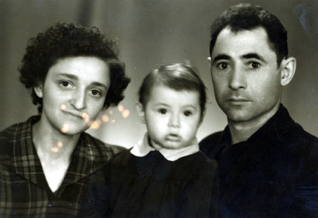Chaim Beitler with his daughter Sofia and wife Dina
These are my uncle Chaim Beitler, his daughter Sofia and wife Dina, Zagare, early 1950s.
My grandmother Mina gave birth to 11 children, out of whom 9 grew up and two died in infancy. Children were born almost every year. When grandpa was alive the family scraped through somehow. When he died in 1930, grandma had to earn for a living. She started selling fish. She and her sons Rubim and my father Leibl went to Klaipeda, Latvia to buy fish and sell it afterwards on our market. When she ran out of money, she borrowed it from people and paid back after her next trip.
My father Leibl Beitler was the eldest in the family, he was born in 1909. In 1927 grandmother gave birth to son Chaim. He was 5 years older than me. We was my friend and protector when I was a child and I grew up. Chaim and grandmother were in evacuation in Kirov. He worked in kolkhoz, then he was drafted in the army at the age of 17. He was assigned to the 16th Lithuanian division. When the Great Patriotic War was over, he had served for three more years and came back in Siaulia in 1948. Here he met a wonderful girl Dina Levina and married her. Her fate is amazing. She was born in a Polish town Vilnius in 1933. She came of a very rich family. Her parents were musicians. When the Soviets came to power, Dina's father was exiled in Siberia [Deportations from the Baltics], and at the very beginning of the war she, her mother and elder brother happened to be in Vilnius ghetto. During one of the first actions Dina was sent in Ponary and one of those who managed to climb out from the pit with the executed people. Dina said that there were about 10 wounded people, sprinkled with the lime, but they were getting out of the pit- being having no clothes and covered with blood stains, they were walking along night Vilnius. It was the autumn, cold and people were not letting them in, some of them even told to return in the pit. On the outskirts of the town some Polish lady sheltered the runaways. She gave food, clothes and bed linen. Somehow ghetto was informed of their escape and ghetto underground organization assisted them. Some of the people came back in ghetto, others were sheltered by somebody. In real, I do not know the fates of other survivors.
Dina's mother, who was staying in ghetto, told her not to come back. Dina's mother and elder brother perished in ghetto. Dina was rescued by a teacher, either Russian or Polish. She gave her the documents of the deceased teacher and Dina had survived the war with the help of those documents serving for different people. When Vilnius was liberated, Dina was feeble that she turned out to be in a military hospital. A Russian lady, a doctor, wanted to adopt her, but she had to leave with the army. Dina was in an orphanage, after which she got some vocational education and was given a mandatory job assignment (trade) in Siaulia. Here she met Chaim and they got married. In couple of years Dina was told that her father was alive. During Great Patriotic War she survive by miracle and moved to Israel via Asian countries. Father started inviting Dina to Israel. At that time former Polish citizens could leave for Poland. Dina and her husband left there in 1956, wherefrom they moved to Israel. Chaim died in 2004. Dina is currently living in Jerusalem with her children- son Aron and daughter Sophia. Dina has many grandchildren. I can say that her postwar life was a reward for the horrors and atrocities she suffered from the war.
